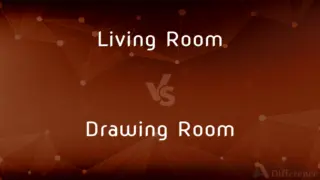Worker vs. Employee — What's the Difference?
By Tayyaba Rehman & Urooj Arif — Published on February 3, 2024
A worker is any individual engaged in work, while an employee is specifically hired and paid by an employer under a contract.

Difference Between Worker and Employee
Table of Contents
ADVERTISEMENT
Key Differences
A worker encompasses anyone engaged in some form of work, regardless of the employment status or job nature. An employee, in contrast, is specifically someone hired by an employer and is usually bound by a formal contract.
Workers can include freelancers, contractors, and employees, showing the term's broader application. Employees are a subset of workers, characterized by their formal relationship with their employers, often including benefits like healthcare.
The term "worker" highlights the act of working itself, without specifying the nature of the employment relationship. Employees, however, are defined by their contractual agreement to perform specific duties for compensation.
Comparison Chart
Definition
Any individual engaged in work
An individual hired by an employer under contract
Employment Relationship
Can be broad, including self-employed
Specific to formal employment arrangements
ADVERTISEMENT
Scope
Wider, includes employees, contractors, etc.
Narrower, specific to contractual employment
Benefits
May not receive employment benefits
Often entitled to benefits like health insurance
Legal Protection
Varies widely depending on work nature
Typically protected by labor laws
Compare with Definitions
Worker
An individual engaged in a task or job.
The worker completed the task efficiently.
Employee
Works under a contract of employment.
Every employee must sign the company's code of conduct.
Worker
May work in various sectors, skilled or unskilled.
The construction worker wore a safety helmet.
Employee
Protected by labor laws and regulations.
The employee's rights were upheld by the labor court.
Worker
Contributes to a project or goal, paid or unpaid.
Volunteer workers helped build the community garden.
Employee
Receives a salary or wages.
The employee received a bonus for exceeding targets.
Worker
One who works at a particular occupation or activity
An office worker.
Employee
Entitled to employment benefits.
Employees at the firm get comprehensive health insurance.
Worker
One who does manual or industrial labor.
Employee
An individual formally hired by a company.
The new employee attended orientation today.
Worker
A member of the working class.
Employee
A person who works for another in return for financial or other compensation.
Worker
A member of a colony of social insects such as ants, bees, wasps, or termites, usually a sterile or sexually immature female but in termites an individual of either sex, that performs specialized work such as building the nest, collecting and storing food, and feeding other members of the colony.
Employee
An individual who provides labor to a company or another person.
One way to encourage your employees to work harder is by giving them incentives.
Worker
A person who performs labor for a living, especially manual labor.
Employee
One employed by another.
Worker
A nonreproductive social insect, such as ant, bee, termite, or wasp.
Employee
A worker who is hired to perform a job
Worker
(rare) A female ant, bee, termite or wasp.
Worker
(computing) A thread performing one instance of a particular task within a program.
This FTP client spawns a separate worker for each file to be uploaded.
Worker
One who, or that which, works; a laborer; a performer; as, a worker in brass.
Professors of holiness, but workers of iniquity.
Worker
One of the neuter, or sterile, individuals of the social ants, bees, and white ants. The workers are generally females having the sexual organs imperfectly developed. See Ant, and White ant, under White.
Worker
A person who works at a specific occupation;
He is a good worker
Worker
A member of the working class (not necessarily employed);
Workers of the world--unite!
Worker
Sterile member of a colony of social insects that forages for food and cares for the larvae
Worker
A person who acts and gets things done;
He's a principal actor in this affair
When you want something done get a doer
He's a miracle worker
Worker
Can be self-employed or employed by others.
As a freelance worker, she sets her own schedule.
Worker
Not necessarily under a formal employment contract.
Seasonal workers help during the harvest.
Common Curiosities
Can a worker be an employee?
Yes, an employee is a type of worker with a formal employment relationship.
What legal protections do employees have?
Employees are usually protected by labor laws, including minimum wage, overtime, and safety regulations.
What defines a worker?
A worker is any individual engaged in work, either as an employee, self-employed, or contractor.
What's the difference in job security between a worker and an employee?
Employees often have greater job security through formal contracts, while other workers may have more flexible or precarious arrangements.
What defines an employee?
An employee is someone formally hired and paid by an employer, typically under a contract.
Are all workers employees?
No, not all workers are employees; workers can also include freelancers and independent contractors.
What role do unions play for workers and employees?
Unions can represent both employees and other types of workers, advocating for rights, wages, and working conditions.
How does taxation differ for workers and employees?
Employees have taxes withheld by their employer, while self-employed workers and contractors must handle their own tax obligations.
Do workers always receive employment benefits?
Not all workers receive benefits; typically, only employees have access to benefits like health insurance and paid leave.
Can employees be independent contractors?
Employees are not independent contractors; these are distinct categories based on the nature of the employment relationship.
How do international labor laws affect workers and employees?
International labor laws set minimum standards for the treatment of workers and employees, but specific protections vary by country.
Are volunteers considered workers?
Volunteers can be considered workers in the broad sense, though they are not paid and do not have the same legal protections as employees.
How does one become an employee?
Becoming an employee typically involves applying for a position, undergoing an interview process, and signing a contract of employment.
What is at-will employment?
At-will employment, prevalent in the U.S., allows either the employer or the employee to terminate employment at any time without cause.
Can a worker be part-time?
Yes, both workers and employees can be part-time, depending on the terms of their work or employment.
Share Your Discovery

Previous Comparison
Living Room vs. Drawing Room
Next Comparison
Endowment Insurance vs. Whole Life InsuranceAuthor Spotlight
Written by
Tayyaba RehmanTayyaba Rehman is a distinguished writer, currently serving as a primary contributor to askdifference.com. As a researcher in semantics and etymology, Tayyaba's passion for the complexity of languages and their distinctions has found a perfect home on the platform. Tayyaba delves into the intricacies of language, distinguishing between commonly confused words and phrases, thereby providing clarity for readers worldwide.
Co-written by
Urooj ArifUrooj is a skilled content writer at Ask Difference, known for her exceptional ability to simplify complex topics into engaging and informative content. With a passion for research and a flair for clear, concise writing, she consistently delivers articles that resonate with our diverse audience.














































